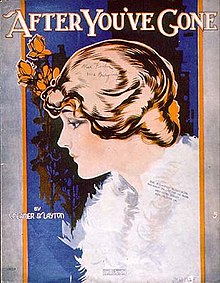After You've Gone (song)
| "After You've Gone" | |
|---|---|
 Sheet music cover (1918) | |
| Song | |
| Published | 1918 |
| Composer(s) | Turner Layton |
| Lyricist(s) | Henry Creamer |
"After You've Gone" is a 1918 popular song composed by Turner Layton with lyrics by Henry Creamer.[1]
History
[edit]It was recorded by Marion Harris on July 22, 1918, and released by Victor Records.[2]
The song became so popular that the sheet music was later decorated with tiny photographs of the 45 men who made the song famous, including Paul Whiteman, Rudy Vallée, B.A. Rolfe, Guy Lombardo, and Louis Armstrong.[3]
Composition
[edit]The chorus adheres to a standard ABAC pattern but is only 20 measures long. There are four 4-bar phrases, followed by a 4-measure tag. The song is harmonically active, with chord changes in almost every measure. The opening four notes to the chorus are identical to the opening notes of "Peg o' My Heart" (1912) — at the time songwriters often borrowed the first few notes of a hit melody.[4]
Notable recordings
[edit]See also
[edit]References
[edit]- ^ a b c d e f g h i j Gioia, Ted (2012). The Jazz Standards. Oxford: Oxford University Press. p. 3. ISBN 978-0-19-993739-4.
- ^ "The Online Discographical Project". The Online Discographical Project. Retrieved April 29, 2017.
- ^ Brothers, Thomas (2014). Louis Armstrong: Master of Modernism. New York: W.W. Norton & Company. p. 366. ISBN 978-0-393-06582-4.
- ^ Furia, Philip; Patterson, Laurie J. (2 December 2015). The American Song Book: The Tin Pan Alley Era. Oxford University Press. pp. 201–. ISBN 978-0-19-049384-4. Retrieved 10 May 2018.
- ^ a b c d e f g Whitburn, Joel (1986). Joel Whitburn's Pop Memories 1890-1954. Wisconsin: Record Research. p. 467. ISBN 0-89820-083-0.
- ^ "A Bing Crosby Discography". BING magazine. International Club Crosby. Retrieved April 26, 2017.
- ^ "A Bing Crosby Discography". BING magazine. International Club Crosby. Retrieved April 24, 2017.
- ^ ""Fats" Waller & Bennie Paine – St. Louis Blues/After You've Gone". Discogs.com. 9 May 2012. Retrieved September 10, 2018.
- ^ "78 Record: Al Jolson - After You've Gone (1949)". 45worlds.com. Retrieved May 30, 2021.
- ^ "78 Record: Frankie Laine - After You've Gone (1954)". 45worlds.com. Retrieved May 30, 2021.
- ^ ""The Phenomenal Dukes of Dixieland - You Have To Hear It To Believe It! Vol. 2"". Discogs. Retrieved 2023-05-16.
- ^ "And I Thought About You - Johnny Hartman | Songs, Reviews, Credits". AllMusic. Retrieved May 30, 2021.
- ^ "In the Name of Love". AllMusic. Retrieved April 29, 2017.
- ^ "Read My Licks". AllMusic. Retrieved May 10, 2018.
- ^ Erlewine, Stephen Thomas. "Let Them Talk". AllMusic. Retrieved 10 May 2018.
- ^ "That Awkward Moment (2014) - IMDb". IMDb.com. Retrieved May 30, 2021.
- ^ Wallace, Simon (24 December 2020). "The Oxcentrics 'After You've Gone'". YouTube. Retrieved 13 November 2024.
External links
[edit]- "After You've Gone by Marion Harris, the original 1918 version at the Internet Archive
- "After You've Gone" by Jelly Roll Morton at the Internet Archive
- "After You've Gone" by Roy Eldridge Orchestra (1937) at the Internet Archive
- "After You've Gone" Chord melody arrangement for guitar
- free-scores.com

